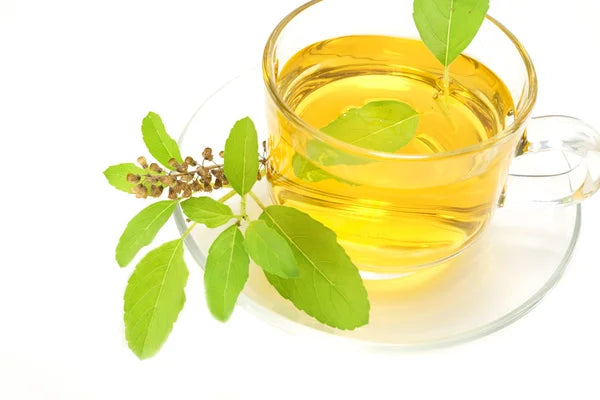

· By Doménica Palacios
The Quali-tea of White Basil
Introducing… White Basil! This is the Quali-tea Series and on this occasion we will be discussing White Basil, another one of the ingredients incorporated into the Waku special fruity and herbal blend. Basil makes a colorful and flavorful addition to many different dishes and teas. It can also provide some serious health benefits. That is why, we decided to mix it up with the rest of our herbs and ingredients in order to create the most powerful yet healthy herbal blend for our teas.
White Thai Holy basil is botanically classified as Ocimum tenuiflorum and is a member of the Lamiaceae or mint family. Basil cultivars are generally categorized into three groups: Thai, sweet, or holy basil. Today, we will be taking about the fun facts, benefits and uses of White or Holy Basil. Check it out!
What is it?

Originally native to India, Asia, and Africa, basil was held to be a sacred and noble herb. In fact, the word “basil” comes from the ancient Greek “basilikhon” which means “royal”. Today, Ocimum basilicum (the scientific name for basil) grows in many places around the world. Many people even grow basil in their kitchens or gardens. This fragrant herb is used as a seasoning in a variety of dishes, and plays a key role in Italian and Thai cuisine.
There are more than 60 varieties of basil, with sweet basil being one of the most widely used. The herb has rounded leaves that are often pointed. It’s a bright green plant, although some varieties have hints of purple or red in their leaves. Popular as a food seasoning, this aromatic herb is also used in teas and supplements which may provide a range of health benefits.
What are its benefits and nutritional facts?

Basil contains many vitamins and minerals, as well as antioxidants such as lutein, zeaxanthin, beta-carotene, and beta-cryptoxanthin. Many of basil’s health benefits come from these antioxidants, as well as its essential oils. Health benefits of basil include:
Cancer Prevention: Its phytochemicals can help to protect against different types of cancer, including lung cancer, liver cancer, oral cancer, and skin cancer.
Supports liver health: A 2015 studyTrusted Source in rats concluded that antioxidants in a powdered preparation that included tulsi, or holy basil, had a positive impact on liver health. The scientists applied the powder after using a toxin to induce liver injury.
Improves Mental Health: White basil is a popular herb in Ayurvedic medicine. Research has shown that it has many benefits, including improving your mental health. It has compounds that can help to alleviate anxiety and depression, increase your ability to think clearly, and lower the risk for age-related memory loss.
Reduces Inflammation: Essential oils in basil, including eugenol, linalool, and citronellol, can help to fight inflammation in the body. These anti-inflammatory properties can help to lower the risk of inflammatory conditions such as arthritis. heart disease, and bowel issues.
How is it used or how could it be prepared?

White Thai Holy basil is mainly used fresh or dried to make a calming and therapeutic tea, though it is also frequently found in Thai cuisine, such as drunken noodles and red or green curries. You can purchase fresh basil in the produce section at most grocery stores. If you need dried basil, you’ll likely find it with other dried herbs and spices. When buying fresh basil, look for vibrant, deep green leaves. Store it in the refrigerator wrapped in a slightly damp cloth or paper towel.
Sweet basil is most widespread, but you may find other varieties at farmers markets or ethnic markets, such as Asian food stores. Alternately, try growing your own. You can grow basil anywhere with nighttime temperatures above 60℉ (15.5℃) for at least two months. Basil is sensitive to cold and likes sun exposure all day. You can cultivate basil from a seed planted in dirt or a stem cut from another plant that you put in water until roots start to grow. Basil will flourish in a garden or patio pot that drains well.
Adverse Effects
Basil is generally safe when ingested in small amounts, but certain health conditions and drugs necessitate caution. Holy basil supplements should be avoided by couples seeking pregnancy.
High levels of vitamin K can affect the action of some drugs, including warfarin (Coumadin). Anyone who uses blood thinners should speak to a doctor before increasing their intake of basil. Some people have allergic reactions if they consume or otherwise come into contact with herbs in the mint family. Anyone with this type of allergy should avoid basil and check pre-made foods to ensure that it is not an ingredient.
Additionally, people taking blood pressure-lowering drugs or diabetes drugs should use caution with basil supplements since they may lower blood pressure and blood sugar. Your doctor may need to decrease your drug dose.
Avoid holy basil if you’re pregnant or trying to get pregnant. Animal studies suggest that holy basil supplements may negatively affect sperm and trigger contractions in pregnancy. Risks during breastfeeding are unknown.
References